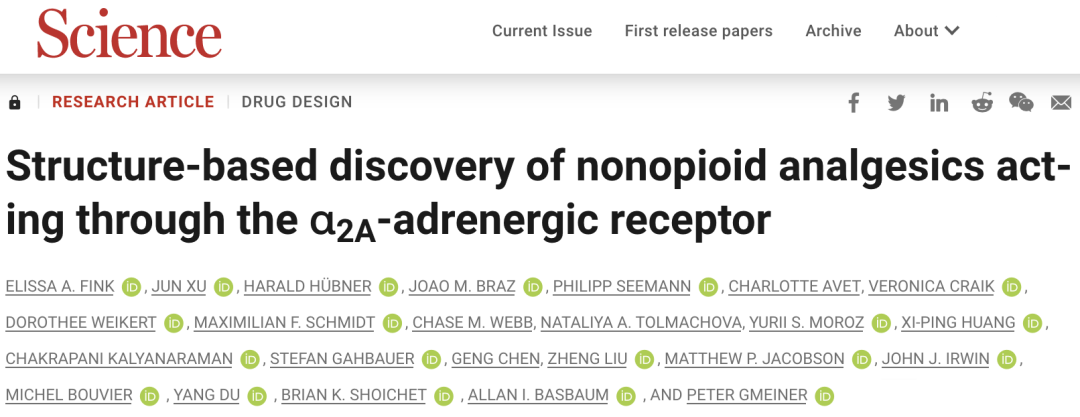预约演示
更新于:2025-05-07
imidazoline receptor
更新于:2025-05-07
基本信息
别名- |
简介- |
关联
17
项与 imidazoline receptor 相关的药物作用机制 imidazoline receptor调节剂 |
在研机构 |
原研机构 |
最高研发阶段临床2期 |
首次获批国家/地区- |
首次获批日期1800-01-20 |
作用机制 I1 receptor激动剂 |
在研机构 |
原研机构 |
在研适应症 |
非在研适应症- |
最高研发阶段临床前 |
首次获批国家/地区- |
首次获批日期1800-01-20 |
5
项与 imidazoline receptor 相关的临床试验EUCTR2017-004655-23-IT
A randomized, double-blind, active- and placebo-controlled, parallelgroup, single dose, multicentre study to assess the analgesic effect of CR4056 inpostoperative dental pain - NA
开始日期2018-06-08 |
申办/合作机构- |
EUCTR2015-001136-37-PL
A randomized, double-blind, parallel group, placebo-controlled study to evaluate the efficacy, safety and tolerability of CR4056 administered for 2 weeks in patients with osteoarthritis of the knee with moderate to severe chronic pain (with or without a neuropathic component)
开始日期2015-08-28 |
申办/合作机构- |
EUCTR2015-001136-37-GB
A randomized, double-blind, parallel group, placebo-controlled study to evaluate the efficacy, safety and tolerability of CR4056 administered for 2 weeks in patients with osteoarthritis of the knee with moderate to severe chronic pain (with or without a neuropathic component)
开始日期2015-08-19 |
申办/合作机构- |
100 项与 imidazoline receptor 相关的临床结果
登录后查看更多信息
100 项与 imidazoline receptor 相关的转化医学
登录后查看更多信息
0 项与 imidazoline receptor 相关的专利(医药)
登录后查看更多信息
1,081
项与 imidazoline receptor 相关的文献(医药)2025-12-01·Cognitive Neurodynamics
Regulatory mechanism of inhibitory interneurons with time-delay on epileptic seizures under sinusoidal sensory stimulation
Article
作者: Wei, Xindan ; Duan, Lixia ; Wang, Zhihui
2025-06-01·European Journal of Pharmacology
The imidazoline I2 receptor agonist 2-BFI enhances cytotoxic activity of hydroxychloroquine by modulating oxidative stress, energy-related metabolism and autophagic influx in human colorectal adenocarcinoma cell lines
Article
作者: Olszewska, Anna ; Kocić, Ivan ; Raczak-Gutknecht, Joanna ; Wityk, Paweł ; Kowalski, Szymon ; Żmijewski, Michał
2025-06-01·Toxicology
Mice mortality induced by dexmedetomidine is non-alpha2-adrenergic receptor-dependent
Article
作者: Wang, Jiaqi ; Yin, Jiye ; Li, Yulei ; Su, Ruibin ; Wang, Xiaoxuan ; Zhou, Peilan
4
项与 imidazoline receptor 相关的新闻(医药)2023-09-27
·生物谷
需要指出的是,尽管9087及其类似物的镇静副作用更低,但是其有效剂量要远高于dex,而且其作用机理和靶标也需要更深入的研究来解释。
近日,由蒙特利尔大学的Michel Bouvier,香港中文大学(深圳)的杜洋,加利福尼亚大学旧金山分校的Brian K. Shoichet和Allan I. Basbaum,以及埃朗根-纽伦堡大学的Peter Gmeiner联合领衔的研究团队,在《科学》期刊上发表了有关止痛药的重要研究成果[1]。
他们将目光聚焦于α2AAR,通过分子对接,从超过3亿个分子中,筛选出了若干个特异性靶向α2AAR的激动剂。在小鼠模型中,这些分子通过注射或者口服均能达到镇痛效果,且在有效剂量下没有镇静的副作用。
论文首页截图
接下来我们就一起来看看这个研究是如何展开的。
研究人员首先进行了分子对接实验。由于目前还没有α2AAR晶体结构的报道,研究人员使用了与α2AAR具有相似活性位点,且晶体结构已知的α2B-肾上腺素受体(α2BAR)。
他们将人α2BAR的晶体结构与3.01亿个分子进行对接试验,得到了64个评分高的结构,之后合成了其中的48个分子。其中,有30个分子与α2BAR的结合常数(Ki)都低于10uM,成功率达到63%,表现最好的分子ZINC1173879087(之后简写为9087),Ki达到1.7nM。
实验显示大部分分子都是α2BAR和α2AAR部分或者完全激动剂。其中有四个激动效果最好的分子,编号分别为:9087、4622、2998、0172。
生物发光共振能量转移(BRET)等实验表明,它们能激活α2AAR-Gi通路,效果可以达到去甲肾上腺素(NorEpi)的60-95%,EC50能达到9.7-210nM。α2AAR作为G蛋白偶联受体(GPCR),其激动剂既可能激活下游G蛋白的α亚基(Gi、Go或者Gz),从而发挥止痛功效,也有可能通过募集β-抑制蛋白,产生受体内化等作用。
9087以及其类似物7075、PS75均为Gi的部分激动剂,与实验中用到的NorEpi、dex、氯压定(clon)等已知的α2AAR的激动剂相比,筛选出的新分子大多能特异性激活Gi、Go和Gz通路,在有效浓度下,对β-抑制蛋白的募集作用可以忽略不计(0172除外),并且没有受体内化现象。
新激动剂(下)与已知激动剂(上)的的结构比较
Gi1激活(左)和β-抑制蛋白募集(右)实验
在筛选出以上四个最有潜力的激动剂分子(9087、4622、2998、0172)之后,研究人员使用冷冻电镜解析出了9087-α2AAR-GoA和4622-α2AAR-GoA的晶体结构,阐明了这些新配体如何与α2AAR相互作用。
尽管9087与dex和NorEpi一样都能与保守位点D128形成相互作用,但是分子朝向和作用方式非常不一样,而这也预示着9087及其类似物很可能是与现存激动剂作用方式不同的新型α2AAR激动剂。
9087-α2AAR-GoA的晶体结构
接下来,研究人员开展了基于9087的结构优化和构效关系分析。
他们发现,替换掉吡啶环、二级胺或者双环结构都会降低激动效果,他们还通过变换取代基获得了若干EC50更低的分子。
基于0987的结构优化和构效关系分析
随后研究人员进行了特异性和药代动力学测试。他们测试了320个GPCRs、µ-阿片受体、hERG(心脏安全相关基因)以及其他肾上腺素受体,9087均未表现出高亲和力。这证明9087的脱靶效应低,可能引发的副作用小。
值得注意的是,咪唑啉-2受体(I2R)是α2AAR激动剂的常见脱靶靶标,9087对α2AAR的亲和力是I2R的6倍,证明了其良好的特异性。之后他们进行了药代动力学测试,让人惊喜的是,无论通过注射或者口服,9087均能透过血脑屏障,在脑脊液中达到有效浓度。
在证明了新分子具有良好的特异性和生物利用度之后,研究人员在小鼠模型上测试了其止痛效果。在健康小鼠上使用9087(5mg/kg),没有增加机械缩足阈值,证明9087不会改变健康小鼠的疼痛阈值。
随后,他们给保留性神经损伤小鼠模型(SNI模型,小鼠由于部分周围神经损伤,对机械痛更加敏感)皮下注射9087,发现机械缩足阈值呈现剂量依赖性增加,从3mg/kg到5mg/kg有大幅度增加,之后便不再增加,处于平稳状态。
低剂量时(<5mg/kg),9087能减轻SNI小鼠对机械痛的敏感程度;高剂量(≥5mg/kg)时,9087的镇痛效果能将机械缩足阈值提高到比损伤前还要高的程度。
新激动剂在健康小鼠(左边3列)和SNI小鼠(右边15列)内对机械痛的作用效果
在完全弗氏佐剂(CFA)诱发的炎症疼痛小鼠模型中,9087可以提高热刺激缩足反应潜伏期。
以上两个实验证明,在小鼠模型中,9087可以缓解由组织和神经损伤导致的疼痛。
除此之外,他们还通过热板和尾闪实验,证明了9078可以缓解急性热刺激疼痛。
新配体在尾闪实验(左)、热板实验(中)、炎症疼痛模型(右)中的效果
为了验证9087是否有镇静的副作用,研究人员让使用高剂量9087的小鼠进行了滚轮跑步机实验,结果发现20mg/kg的9087也未能影响小鼠的运动表现。这证明9087不像dex一样有镇静的副作用。
接下来研究人员研究了9087镇痛的机理。
他们发现,使用广谱α2-肾上腺素受体(α2AR)的拮抗剂阿替美唑之后,9087就不再有止痛效果。然而,在使用点突变使α2AAR失活后(D79N),9087仍有镇痛效果,但是效果不到未突变组的50%。
这些实验结果表明,9087的镇痛效果虽然大部分是由于激活α2AAR引发的,但是可能也存在着其他靶标。
使用广谱拮抗剂后(左)和点突变使α2AAR失活后(右)新激动剂的镇痛效果
最后,研究人员测试了9087是否有止痛药的一些常见副作用。
好消息是,9087(10mg/kg)没有导致体重增加或是便秘等常见的α2AAR激动剂的副作用。除此之外,研究人员也测试了其他待选分子,它们虽然也有镇痛效果,但是整体来说还是9087的效果更好,副作用更低。
总的来说,这个研究通过大型分子库的对接试验,筛选出了一系列与已知α2AAR激动剂结构有较大差异的配体结构。这些分子特异性靶向Gi/o/z通路,其中分子9087及其类似物具有良好的口服生物利用度和镇痛效果,并且没有镇静的副作用,是非常有潜力的镇痛药候选分子。
需要指出的是,尽管9087及其类似物的镇静副作用更低,但是其有效剂量要远高于dex,而且其作用机理和靶标也需要更深入的研究来解释。

临床结果临床1期
2023-08-07
·生物谷
精神分裂症、双相障碍、抑郁症等不同精神疾病的患者往往表现出相似的临床症状和病理特征,表明这些疾病可能存在共有发病机制。随着全基因组关联分析的开展,遗传学研究发现,这些精神疾病共享了许多风险基因,表明这
精神分裂症、双相障碍、抑郁症等不同精神疾病的患者往往表现出相似的临床症状和病理特征,表明这些疾病可能存在共有发病机制。随着全基因组关联分析的开展,遗传学研究发现,这些精神疾病共享了许多风险基因,表明这些共有风险基因可能与共有发病机制有关,因此研究共有风险基因的功能可提升科学家对精神疾病发病机制的认知。
前期,中国科学院昆明动物研究所研究员李明团队在染色体3p21.1区域鉴定到影响精神分裂症和双相障碍发病风险的转座子插入/缺失多态位点(Alu polymorphism)。研究显示,携带该Alu元件的个体患多种精神疾病的风险升高,且Alu元件显著影响周围DNA序列的增强子活性。近期,研究发现,以CRISPR/Cas9技术将该Alu元件在细胞中删除后会显著降低距其180-Kb的NISCH基因(编码非肾上腺素能咪唑啉-1受体的Nischarin蛋白)的mRNA表达。人脑组织高通量染色体构象捕获结果、基于精神疾病患者和健康个体脑组织的高通量测序结果显示,NISCH的表达升高是精神疾病风险因素。因此,该Alu元件可能通过影响NISCH基因表达参与疾病发生。为探究NISCH异常高表达的功能后果,研究分别在原代培养神经元和小鼠海马脑区过表达了NISCH,发现该基因表达升高会致使蘑菇型树突棘密度显著下降以及突触后致密蛋白Psd95表达的减少,而NISCH可能通过与肌动蛋白关联蛋白Actr2结合影响突触结构。与对照小鼠相比,在海马脑区过表达NISCH的小鼠在Y迷宫范式中出现明显的空间工作记忆障碍。研究显示,降压药可乐定能显著下调NISCH的表达并挽救小鼠的认知功能损伤。上述研究从遗传学研究发现入手,解析了精神分裂症和双相障碍的共有发病机制,发现了降压药可乐定有助于改善认知损伤,为精神疾病的治疗提供了新思路。相关成果以Identification of a psychiatric risk gene NISCH at 3p21.1 GWAS locus mediating dendritic spine morphogenesis and cognitive function为题,发表在《BMC医学》(BMC Medicine)上。研究工作得到国家自然科学基金、云南省基础研究计划和春城计划等的支持。
此外,研究基于对抑郁症全基因组关联分析数据的整合研究,结合跨人群的精细分析、表观基因组分析和体外功能实验,在VRK2基因(编码丝氨酸/苏氨酸激酶)的5'端上游发现一个功能性抑郁症风险变异rs2678907(该变异的疾病风险等位基因型降低DNA增强子活性和VRK2基因表达水平)。上述研究与抑郁症患者脑中VRK2基因的mRNA表达下调现象一致,但该基因的缺失是否导致抑郁样行为仍不清楚。为此,研究利用Vrk2全身敲除小鼠开展的悬尾实验等研究发现,这些小鼠与野生型小鼠相比出现一定程度的抑郁样行为,在腹侧海马中回复Vrk2表达的敲除小鼠出现抗抑郁样行为;在野生型小鼠腹侧海马中特异性敲降Vrk2会导致它们在悬尾和糖水偏好实验中出现抑郁样行为。上述研究表明腹侧海马中Vrk2的缺乏可致使出现抑郁样行为。此外,研究通过稀疏标记染色实验发现,Vrk2敲除小鼠的腹侧海马神经元出现蘑菇型树突棘和瘦长型树突棘密度的显著改变,并大量富集于突触相关生物学通路的蛋白出现磷酸化水平的异常。上述研究为Vrk2参与抑郁症发生的机制提供了潜在线索。相关成果以Reduced Vrk2 expression is associated with higher risk of depression in humans and mediates depressive-like behaviors in mice为题,发表在《BMC医学》(BMC Medicine)上。研究工作得到国家自然科学基金、云南省基础研究计划、春城计划、浙江省杰出青年基金等的支持。
临床研究基因疗法临床结果
2023-02-06
·生物谷
为了系统研究胰腺外分泌部细胞谱系命运转变,研究人员建立了一种可以同时示踪胰腺导管细胞和腺泡细胞的新型双同源谱系示踪技术。
近日,中国科学院分子细胞科学卓越创新中心(生物化学与细胞生物学研究所)周斌团队以Use of a dual genetic system to decipher exocrine cell fate conversions in the adult pancreas为题在Cell Discovery上发表研究成果。该研究开发了可以同时示踪胰腺外分泌部导管细胞和腺泡细胞的双同源重组酶介导的谱系示踪新技术,利用该技术揭示了在特定条件下,胰腺导管细胞和腺泡细胞可以发生细胞命运转变。该研究为胰腺炎等相关疾病的临床治疗提供了一定理论基础。
胰腺是体内仅次于肝脏的第二大腺体,其中,外分泌部构成了胰腺的绝大部分,主要由腺泡细胞和导管细胞构成。腺泡细胞可以产生和释放大量消化酶,包括淀粉酶、脂肪酶等,这些消化酶经过胰腺导管输送到十二指肠,对于机体消化过程发挥了重要作用。在胰腺中,外分泌导管细胞和腺泡细胞是否可以在生理病理条件下发生谱系转变仍具有一定争议。传统基于Cre-loxP的多项遗传示踪工作对于胰腺外分泌部细胞谱系转变具有不同的结果。揭示胰腺导管细胞和腺泡细胞命运转变可以为胰腺相关疾病的预防和靶向治疗提供帮助和依据。
为了系统研究胰腺外分泌部细胞谱系命运转变,研究人员建立了一种可以同时示踪胰腺导管细胞和腺泡细胞的新型双同源谱系示踪技术。研究人员发现Tnni3-Dre和正交位点特异性双同源重组系统交叉型报告小鼠IR1在胰腺外分泌部中可以特异性标记腺泡细胞,而基本不标记其他类型的细胞,可以避免CK19-CreER小鼠对于腺泡细胞的“非特异性标记”,该设计实现用两个不同的永久遗传报告基因标记胰腺导管细胞和腺泡细胞:zsGreen和tdTomato。
利用该系统,研究人员发现在稳态和胰腺切除情况下,胰腺导管细胞和腺泡细胞主要来源于自我复制,而在胰腺导管结扎和雨蛙素诱导的胰腺炎模型中,一部分胰腺腺泡细胞发生形态转变成管状结构,并不再表达腺泡细胞标记物,细胞命运转变成导管细胞。而在利用白喉毒素介导清除大部分胰腺腺泡细胞后,可以看到胰腺导管细胞参与贡献部分腺泡细胞。利用单细胞测序技术发现,导管细胞转变成为腺泡细胞经历了一个不成熟腺泡细胞的过程,说明胰腺导管细胞同样具有向腺泡细胞转分化的潜能。该研究工作为胰腺炎等相关疾病发病机制的深入挖掘及疾病治疗研究等提供了新的研究工具和思路。
胰腺导管细胞和腺泡细胞之间命运转变
内容来源于网络,如有侵权,请联系删除。
细胞疗法
分析
对领域进行一次全面的分析。
登录
或

生物医药百科问答
全新生物医药AI Agent 覆盖科研全链路,让突破性发现快人一步
立即开始免费试用!
智慧芽新药情报库是智慧芽专为生命科学人士构建的基于AI的创新药情报平台,助您全方位提升您的研发与决策效率。
立即开始数据试用!
智慧芽新药库数据也通过智慧芽数据服务平台,以API或者数据包形式对外开放,助您更加充分利用智慧芽新药情报信息。
生物序列数据库
生物药研发创新
免费使用
化学结构数据库
小分子化药研发创新
免费使用

